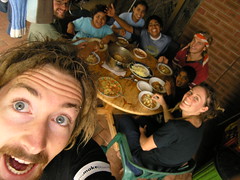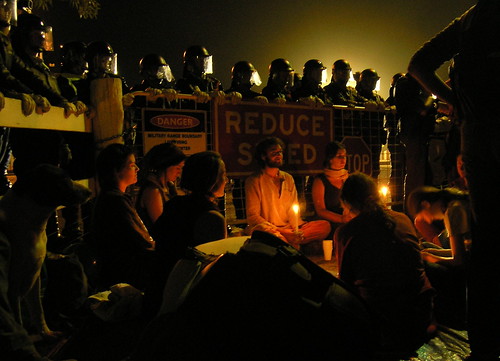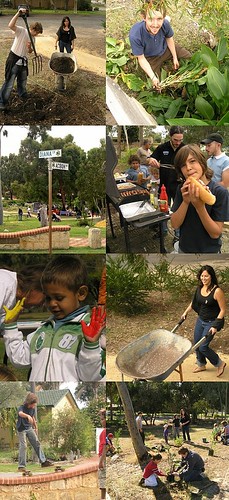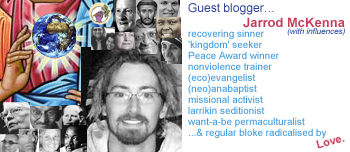
Jarrod McKenna download election dvdrip ’s Wednesday’s with Gandhi:

-Gandhi “The Modern Review: Oct. 1941”
(This might be the post our reformed friends drown me for 😉 )
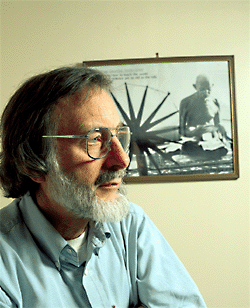
I remember the first time I wrote in my journal in 2001, “Jesus are you bigger than Christianity?” At the time I was one of two white people within eight blocks living in East Nashville with Karl Meyer. Karl is an amazing man who became a Christian through Dorothy Day
I have a mate who had a life changing experience watching “South Park” when he saw Gandhi in hell with Hitler. (God can use anything I guess).
I know for many this might provoke questions of who’s going to heaven (or hell) and who’s not. But that’s not what was going on in my head and heart when I was was journaling while living in this poor neighbourhood where I heard guns shots. My questions weren’t coming out of an understanding of the gospel ‘as fire insurance for the afterlife’ nor ‘sin management’. Nor where they coming out of a liberal ‘social gospel’ that reduced the gospel to ideals and principles. Instead they were arising out of a burning desire in me for an alternative to the fundamentalism and the liberalism which is so often on offer.
I longed for a Christianity that was ‘evangelical’ in the sense of being ‘good news’ to our hurting world that had integrity when it came to the context of the early Christians and how they would have understood the gospel (instead of just arguments of the sixteenth century read back into Scripture). I became convinced that the gospel is about God’s will being done “on earth” as Jesus taught us to pray and that we don’t “go to glory” rather biblically glory is coming here and it has broken in through Jesus! (notice the direction of the New Jerusalem or the Son of Man… this however has not effected the sales of ‘left behind’).
 Gandhi famously refused to become a Christian yet daily spent 2 hours meditating after reading the Jesus’ Sermon on the Mount. (Anybody know any Christians who spent 2 hours meditating on Christ’s teachings today?) Repeatedly when asked for the inspiration of his nonviolent revolution in India he would not fail to mention Jesus and his teachings. Gandhi’s dedication to Jesus and practice of his teachings cannot be doubted, nor can his dedication to his Hinduism (albeit a Hinduism that looks like Jesus. So much so Gandhi was often accused of “Christianising” Hinduism and was finally shot by someone who believed he was corrupting Hinduism.)
Gandhi famously refused to become a Christian yet daily spent 2 hours meditating after reading the Jesus’ Sermon on the Mount. (Anybody know any Christians who spent 2 hours meditating on Christ’s teachings today?) Repeatedly when asked for the inspiration of his nonviolent revolution in India he would not fail to mention Jesus and his teachings. Gandhi’s dedication to Jesus and practice of his teachings cannot be doubted, nor can his dedication to his Hinduism (albeit a Hinduism that looks like Jesus. So much so Gandhi was often accused of “Christianising” Hinduism and was finally shot by someone who believed he was corrupting Hinduism.)
![]() He’s the kind thinker that would be interesting if he didn’t practice his ideas making him so dangerous. He the kind of guy who is an influence on many but quoted by few because of fears that they to might experience the ‘blessings of being cursed’ that are seen in his life because of the way he challenges the principalities and powers. He has a gentleness and humility that is intimidating to the shamsters who travel the speaking circuit enjoying the fanfare and praise while merely talking about what he quietly speaks with his life away from the cameras and applause. Like Gandhi he has been written off by many Christians. Not because of his witness, his life, like Gandhi’s, has become a modern day metaphor for Christ-likeness. But he has been written off for suggesting that maybe Gandhi isn’t burning in hell for not becoming a Christian (it wan’t South Park that convinced him).
He’s the kind thinker that would be interesting if he didn’t practice his ideas making him so dangerous. He the kind of guy who is an influence on many but quoted by few because of fears that they to might experience the ‘blessings of being cursed’ that are seen in his life because of the way he challenges the principalities and powers. He has a gentleness and humility that is intimidating to the shamsters who travel the speaking circuit enjoying the fanfare and praise while merely talking about what he quietly speaks with his life away from the cameras and applause. Like Gandhi he has been written off by many Christians. Not because of his witness, his life, like Gandhi’s, has become a modern day metaphor for Christ-likeness. But he has been written off for suggesting that maybe Gandhi isn’t burning in hell for not becoming a Christian (it wan’t South Park that convinced him).
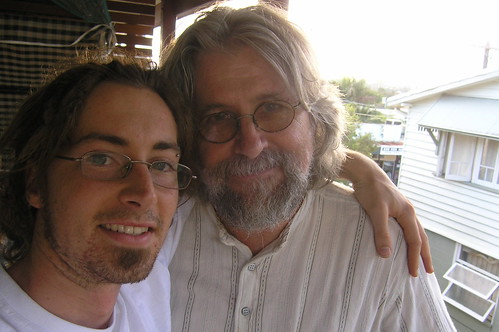
What is more interesting is that he hasn’t compromised on the centrality of Christ, nor avoided the question, nor departed from Scripture. But like Paul he’s suggested that maybe the “circumcisions” of our day make a mockery of the gospel. That the gospel was never about fire insurance for the afterlife nor sin management but God’s desire to heal creation which has broken into reality in Christ. His name is Dave Andrews and his books are a gift to the church at this time in history and a valuable companion to anyone thinking missionaly.
Like Gandhi we all wont agree with everything Dave says (we’re still talking about where an ecclesia fits in the ‘open set’ in his book Christi-Anarchy). But like Gandhi to ignore his life and writings is to miss a rich opportunity for our own journey and how better to bring others on that journey with us toward a the Jesus bigger than the boxes we put him in and a Christianity that does Christ justice.

 Today in the mail I received an opportunity to bless this brother back. His publisher has sent me his newest book “Everything Must Change: Jesus, Global Crises, and a Revolution of Hope” to review before it’s released later this year.
Today in the mail I received an opportunity to bless this brother back. His publisher has sent me his newest book “Everything Must Change: Jesus, Global Crises, and a Revolution of Hope” to review before it’s released later this year. “In my travels around the world, I see a lot to inspire cynicism -including a lot of shabby religious stuff I’d rather not even give examples of. But I also meet people who inspire hope and courage in me -emerging young leaders who “get” Jesus’ message of the kingdom of God, and who are living it and giving it away. They see the integral nature of mission – that it brings together God and humanity, humanity and creation, grace and nature, contemplation and action, evangelism and social justice, faith and politics, the making of disciples and the making of peace.
“In my travels around the world, I see a lot to inspire cynicism -including a lot of shabby religious stuff I’d rather not even give examples of. But I also meet people who inspire hope and courage in me -emerging young leaders who “get” Jesus’ message of the kingdom of God, and who are living it and giving it away. They see the integral nature of mission – that it brings together God and humanity, humanity and creation, grace and nature, contemplation and action, evangelism and social justice, faith and politics, the making of disciples and the making of peace. 
 What about Gandhi’s comments about “His so-called followers measure their moral progress by their material possessions.” Gandhi’s comments where even before ‘prosperity gospel’ was popular. Is it more true now?
What about Gandhi’s comments about “His so-called followers measure their moral progress by their material possessions.” Gandhi’s comments where even before ‘prosperity gospel’ was popular. Is it more true now?

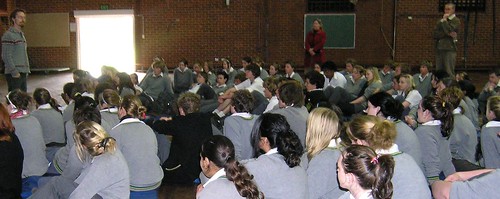

 2. The biblical passage which Gandhi is referring to is Matthew 28:18-20. In part it reads, “teaching them to obey everything I have commanded you”. Is it the ‘mission’ of the God revealed in Jesus if we are not teaching people the practicalities of what Jesus taught? If we teach a theory of atonement and neglect to teach ‘converts’ to live Jesus’ way have we really made disciples? If we don’t teach giving to the needy in secret (instead of calling a press conference), to pray for God’s will of justice,peace and joy to be done (instead of our will or the will of our nation), to seek first God’s transforming presence (instead of careers or our agenda) to first remove the plank from our own eye (instead of judging others) and to love our enemies (instead of bombing them) have we really made followers, students, disciples of Jesus?
2. The biblical passage which Gandhi is referring to is Matthew 28:18-20. In part it reads, “teaching them to obey everything I have commanded you”. Is it the ‘mission’ of the God revealed in Jesus if we are not teaching people the practicalities of what Jesus taught? If we teach a theory of atonement and neglect to teach ‘converts’ to live Jesus’ way have we really made disciples? If we don’t teach giving to the needy in secret (instead of calling a press conference), to pray for God’s will of justice,peace and joy to be done (instead of our will or the will of our nation), to seek first God’s transforming presence (instead of careers or our agenda) to first remove the plank from our own eye (instead of judging others) and to love our enemies (instead of bombing them) have we really made followers, students, disciples of Jesus?
 After studying Gandhi, Dr. King was no longer willing to limit Jesus’ commandments to love God, self, neighbour and enemy to just ‘individual relationships’. No longer willing to limit God’s love and keep it just a private reality instead of permeating all of life. No longer willing to limit the Lordship of Jesus to merely the heart excluding it from the social, political and economic as well.
After studying Gandhi, Dr. King was no longer willing to limit Jesus’ commandments to love God, self, neighbour and enemy to just ‘individual relationships’. No longer willing to limit God’s love and keep it just a private reality instead of permeating all of life. No longer willing to limit the Lordship of Jesus to merely the heart excluding it from the social, political and economic as well. invite in the refugee, cloth the naked, look after the sick, visit the imprisoned and be prepared not to compromise on what Martin Luther King called “the power of love” as we seek to transform the Powers to serve the humanising purposes of God. Even if it means going the way of the cross, trusting only in resurrection power.
invite in the refugee, cloth the naked, look after the sick, visit the imprisoned and be prepared not to compromise on what Martin Luther King called “the power of love” as we seek to transform the Powers to serve the humanising purposes of God. Even if it means going the way of the cross, trusting only in resurrection power.